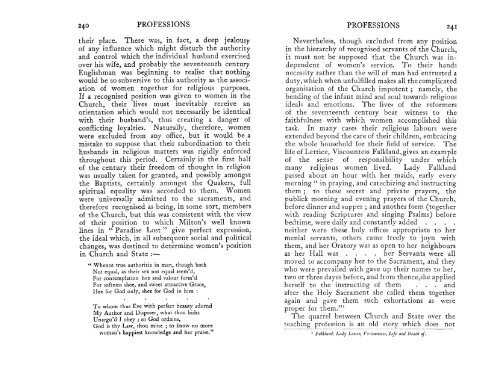working life of women seventeenth century - School of Economics ...
working life of women seventeenth century - School of Economics ...
working life of women seventeenth century - School of Economics ...
You also want an ePaper? Increase the reach of your titles
YUMPU automatically turns print PDFs into web optimized ePapers that Google loves.
24O PROFESSIONS PROFESSIONStheir There was, in fact, a deep jealousy<strong>of</strong> any influence which might disturb the authorityand control which the individual husband exercisedover his wife, and probably the <strong>seventeenth</strong> <strong>century</strong>Englishman was beginning to realise that nothingwould be so subversive to this authority as the association<strong>of</strong> <strong>women</strong> together for religious purposes.If a recognised position was given to <strong>women</strong> in theChurch, their lives must inevitably receive anorientation which would not necessarily be identicalwith their husband's, thus creating a danger <strong>of</strong>conflicting loyalties. Naturally, therefore, <strong>women</strong>were excluded from any <strong>of</strong>fice, but it would be amistake to suppose that their subordination to theirhusbands in religious matters was rigidly enforcedthroughout this period. Certainly in the first half<strong>of</strong> the <strong>century</strong> their freedom <strong>of</strong> thought in religionwas usually taken for granted, and possibly amongstthe Baptists, certainly amongst the Quakers, fullspiritual equality was accorded to them. Womenwere universally admitted to the sacraments, andtherefore recognised as being, in some sort, members<strong>of</strong> the Church, but this was consistent with the view<strong>of</strong> their position to which Milton's well knownlines in " Paradise Lost " give perfect expression,the ideal which, in all subsequent social and politicalchanges, was destined to determine <strong>women</strong>'s positionin Church and State :-U Whence true authoritie in men, though bothNot equal, as their sex not equal seem'd,For contemplation hee and valour form'dFor s<strong>of</strong>tness shec, and sweet attractive Grace,Hee for God only, shee for God in him :To whom thus Eve with perfect beauty adorndMy Author and Disposer, what thou bidstUnargu'd I obey ; so God ordains,God is thy Law, thou mine ; to know no morewoman's happiest knowledge and her praise.''Nevertheless, though excluded from any positionin the hierarchy <strong>of</strong> recognised servants <strong>of</strong> the Church,it must not be supposed that the Church was independent<strong>of</strong> <strong>women</strong>'s service. To their handsnecessity rather than the will <strong>of</strong> man had entrusted aduty, which when unfulfilled makes all the complicatedorganisation <strong>of</strong> the Church impotent ; namely, thebending <strong>of</strong> the infant mind and soul towards religiousideals and emotions. The live.; <strong>of</strong> the reformers<strong>of</strong> the <strong>seventeenth</strong> <strong>century</strong> bear witness to thefaithfulness with which <strong>women</strong> accomplished thistask.In many cases their religious labours wereextended beyond the care <strong>of</strong> their children, embracingthe whole household for their field <strong>of</strong> service. The<strong>life</strong> <strong>of</strong> Lettice, Viscountess Falkland, gives an example<strong>of</strong> the sense <strong>of</strong> responsibility under whichmany religious <strong>women</strong> lived. Lady Falklandpassed about an hour with her maids, early everymorning " in praying, and catechizing and instructingthem; to these secret and private prayers, thepublick morning and evening prayers <strong>of</strong> the Church,before dinner and supper ; and another form (togetherwith reading Scriptures and singing Psalms) beforebedtime, were daily and constantly added . . . .neither mere these holy <strong>of</strong>ices appropriate to hermenial servants, others came freely to joyn withthem, and her Oratory was as open to her neighboursas her Hall was . . . . her Servants were allmoved to accompany her to the Sacrament, and theywho were prevailed with gave up their names to her,two or three dayes before, and from thence,she applied. . . andherself to the instructing <strong>of</strong> then1after the Holy Sacrament she called them togetheragain and gave them such exhortations as wereproper for them."'The quarrel between Church and State over theteaching pr<strong>of</strong>ession is an old story which does notFalkland. Lady Letrce2 Yr-countess, Ltfe and Death <strong>of</strong>.
















